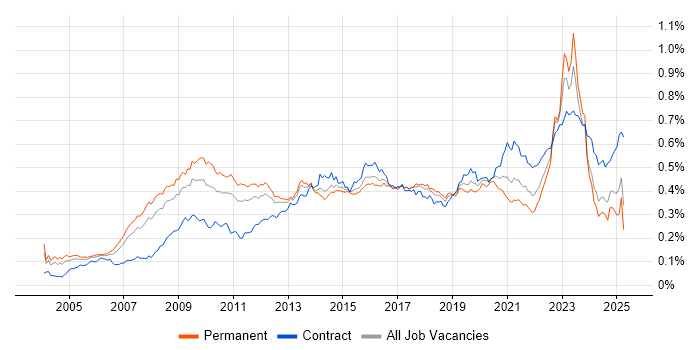Enterprise Architect
UK > England
The median Enterprise Architect salary in England is £90,000 per year, according to job vacancies posted during the 6 months leading to 11 May 2025.
The table below provides salary benchmarking and summary statistics, comparing them to the same period in the previous two years.
| 6 months to 11 May 2025 |
Same period 2024 | Same period 2023 | |
|---|---|---|---|
| Rank | 530 | 544 | 385 |
| Rank change year-on-year | +14 | -159 | +386 |
| Permanent jobs requiring an Enterprise Architect | 146 | 297 | 757 |
| As % of all permanent jobs advertised in England | 0.30% | 0.35% | 0.84% |
| As % of the Job Titles category | 0.33% | 0.37% | 0.92% |
| Number of salaries quoted | 96 | 256 | 254 |
| 10th Percentile | £63,500 | £70,919 | £61,625 |
| 25th Percentile | £72,500 | £75,208 | £83,750 |
| Median annual salary (50th Percentile) | £90,000 | £95,000 | £100,000 |
| Median % change year-on-year | -5.26% | -5.00% | +2.56% |
| 75th Percentile | £115,000 | £109,063 | £120,000 |
| 90th Percentile | £123,125 | £120,000 | £130,000 |
| UK median annual salary | £90,000 | £95,000 | £100,000 |
| % change year-on-year | -5.26% | -5.00% | +5.26% |
All Permanent IT Job Vacancies
England
For comparison with the information above, the following table provides summary statistics for all permanent IT job vacancies in England. Most job vacancies include a discernible job title that can be normalized. As such, the figures in the second row provide an indication of the number of permanent jobs in our overall sample.
| Permanent vacancies in England with a recognized job title | 43,811 | 81,137 | 82,278 |
| % of permanent jobs with a recognized job title | 90.57% | 94.49% | 91.47% |
| Number of salaries quoted | 24,794 | 60,555 | 52,271 |
| 10th Percentile | £30,000 | £28,500 | £32,500 |
| 25th Percentile | £41,280 | £38,250 | £45,000 |
| Median annual salary (50th Percentile) | £57,500 | £53,500 | £60,800 |
| Median % change year-on-year | +7.48% | -12.01% | +1.33% |
| 75th Percentile | £75,000 | £71,688 | £82,500 |
| 90th Percentile | £97,500 | £91,000 | £100,000 |
| UK median annual salary | £57,443 | £52,500 | £60,000 |
| % change year-on-year | +9.41% | -12.50% | - |
Enterprise Architect
Job Vacancy Trend in England
Job postings that featured Enterprise Architect in the job title as a proportion of all IT jobs advertised in England.

Enterprise Architect
Salary Trend in England
3-month moving average salary quoted in jobs citing Enterprise Architect in England.
Enterprise Architect
Salary Histogram in England
Salary distribution for jobs citing Enterprise Architect in England over the 6 months to 11 May 2025.
Enterprise Architect
Job Locations in England
The table below looks at the demand and provides a guide to the median salaries quoted in IT jobs citing Enterprise Architect within the England region over the 6 months to 11 May 2025. The 'Rank Change' column provides an indication of the change in demand within each location based on the same 6 month period last year.
| Location | Rank Change on Same Period Last Year |
Matching Permanent IT Job Ads |
Median Salary Past 6 Months |
Median Salary % Change on Same Period Last Year |
Live Jobs |
|---|---|---|---|---|---|
| London | +68 | 58 | £105,000 | - | 45 |
| South East | +112 | 36 | £95,000 | +11.76% | 30 |
| North of England | -4 | 26 | £80,000 | -5.88% | 13 |
| Midlands | +67 | 23 | £64,750 | -18.99% | 11 |
| North West | -28 | 13 | £80,000 | -5.88% | 9 |
| Yorkshire | +35 | 12 | £85,000 | -5.56% | 4 |
| East Midlands | - | 12 | £63,500 | - | 5 |
| West Midlands | +50 | 11 | £75,000 | -6.17% | 6 |
| South West | +65 | 3 | £90,000 | -10.06% | 14 |
| North East | +46 | 1 | £55,000 | -33.31% | |
| Enterprise Architect UK |
|||||
Enterprise Architect Skill Set
Top 30 Co-occurring Skills and Capabilities in England
For the 6 months to 11 May 2025, Enterprise Architect job roles required the following skills and capabilities in order of popularity. The figures indicate the absolute number co-occurrences and as a proportion of all permanent job ads across the England region featuring Enterprise Architect in the job title.
|
|
Enterprise Architect Skill Set
Co-occurring Skills and Capabilities in England by Category
The follow tables expand on the table above by listing co-occurrences grouped by category. The same employment type, locality and period is covered with up to 20 co-occurrences shown in each of the following categories:
